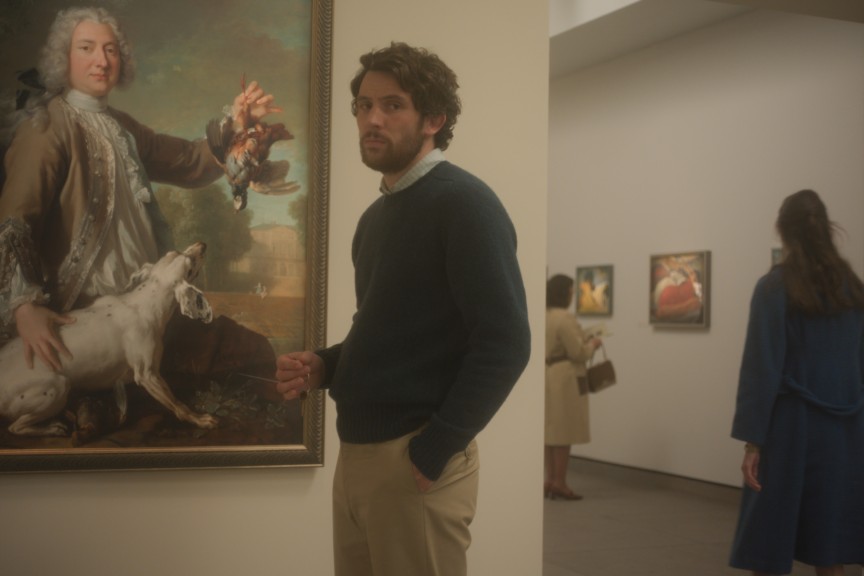Josh O’Connor is living a fevered year of cinema at this year’s LFF, with The History of Sound, The Mastermind, and the opening gala Wake Up Dead Man. Compared with the buzz and starry glow surrounding the new Knives Out film, The Mastermind feels quieter, more introspective, yet it is the one that draws him back to melancholy. Kelly Reichardt, the quiet cartographer of American life, finds in him the rare sadness that drifts through her cinema. Though he comes from England, O’Connor seems made for Reichardt’s world. Her America is not built on heroes but on ordinary souls who live with silence, longing, and unease.
Set in 1970s Massachusetts, The Mastermind follows James Blaine ‘JB’ Mooney (O’Connor), a former art student turned unemployed carpenter, who lives with his wife Terri (Alana Haim) and their two sons, Carl (Sterling Thompson) and Tommy (Jasper Thompson). Supported by his parents, Judge Bill Mooney (Bill Camp) and Sarah (Hope Davis), JB feels trapped in the quiet despair of his middle-class life while the Vietnam War rages and protests fill the streets. Hoping to reclaim a sense of purpose, he recruits two unreliable accomplices, Guy Hickey (Eli Gelb) and Ronnie Gibson (Javion Allen), to steal four Arthur Dove paintings from a Boston museum. The heist succeeds at first but unravels almost immediately, as JB’s lack of foresight and reckless attempt to profit from the theft draws the attention of the police and the FBI. As his family’s reputation crumbles and his life falls apart, he is forced to go on the run, experiencing a chaotic, humiliating, and distinctly unglamorous fugitive life on the road.
Irony hums in the title. Reichardt never mistakes JB for a true mastermind. Instead, her lens rests upon his clumsy cunning and his small, pitiful reach for control. He is a thief of gestures more than art, surviving on borrowed charm, living off the patience of others. He milks affection from his parents, borrows from friends, and glides through days as if buoyed by an invisible grace. When that grace falters, when Terri’s faith wanes and his partners betray him, the illusion shatters. Even the old friends once entranced by his easy wit now turn away. The film does not punish him, but it quietly watches his unraveling, as if tenderness itself were bearing witness.
At its centre is O’Connor’s haunting performance, a study in the ruins of charisma. He gives JB the fragility of a man who has mistaken charm for purpose and now finds himself hollowed out. The character recalls the broken figures of Inside Llewyn Davis or Conor McPherson’s Girl from the North Country, a man undone by inertia and by his own refusal to grow. JB lies to his parents, shirks his wife, and disappoints his children. He is selfish, lazy, and evasive, yet beneath his ruin there is something that aches, tender and tragic. He still tries to charm the world even though that magic has long since died. There is something unbearably human about his persistence, his refusal to wake from the delusion that he might still be loved. The sadness lies not in his awfulness but in his futility, in the way he keeps moving long after motion has lost meaning. In Reichardt’s hands, this futility becomes eternal.
Reichardt’s gift, as ever, lies in her texture. From Wendy and Lucy to Certain Women, from First Cow to Showing Up, she composes spaces where silence breathes and longing lingers. Here, Rob Mazurek’s jazz drifts through the film like breath, alive and restless. The rhythm shifts midway, bold yet unmistakably hers. The Mastermind is not a heist film but a portrait of lostness, of young souls caught between past and future, of a country uncertain of what it is becoming. It speaks of the unspoken, of the sadness of being human, of the quiet rebellion that comes with continuing to live. Some may find it frustrating, seeking the thrill of the heist or the comfort of moral closure. It offers neither. Instead, it moves with life, wounded and poetic, a film about lost souls and the impossible persistence of hope without direction.
In the end, The Mastermind will not satisfy those who crave meanings. It is a film that moves like a daydream, lingering, elusive, alive. It refuses to instruct or console. Instead, it invites us to drift beside JB through failure and longing, through the quiet ache of existence.
It is, in its way, a poem about life itself; brief, broken, and beautifully lost.
Screened as part of BFI London Film Festival on the road


Comments